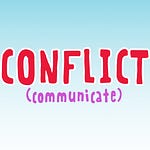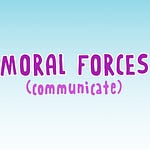Abbie: Hello and welcome to the CosmoParenting Podcast brought to you by the CMM Institute for Personal and Social Evolution. In this space, we invite you to see yourself as someone who is curious about and actively participating in creating your own meaning around parenting.
This is our ‘Communicate’ episode, in which the fourth episode of each month we will wrap up our theme by offering some ideas for communicating with your children, co-parents, or whoever else might be a part of your parenting, to start having conversations about the things you are learning here. Let’s begin.
*music*
Abbie: Today, I am joined by Don Waisanen. Don is a father to three boys ages 13 and under at the time of our recording. And Don is also a professor in the Baruch College at City University of New York (CUNY), Marxe School of Public and International Affairs. He's a consultant, author, and an improviser. Hi, Don. Thanks for being here today.
Don: Hey, Abbie. Thanks so much for having me.
Abbie: So, in the last episode that I did with Stephanie, she offered us a strategy that was called ‘Keep and Release’ for this month's theme of patterns. And the point of that was to help us reflect on once we can see our parenting through the lens of patterns, what do we want to do with the patterns? With all of that in mind, what would you add about how parents might go about communicating around patterns?
Don: I think this focus on communication as patterned is incredibly useful. I think, if anything, communication is just structures- often that we've inherited. And a lot of our parenting practices, I've come to realize over time, it's the same thing, right?
You go, oh, where did that come from? Oh, I'm channeling somebody in my life, you know, a script that I was handed. And so I often think about what it is to unscript from some of those patterns that we have and look at what might be more productive scripts for us and our kids. And along those lines, the way I tend to think about a lot of this is through games. In my parenting journey, I now have a 13 year old, I have a nine year old, I have a six year old. I've just come to realize how much of parenting life has game-like structures to it, right?
One of the most basic ones I can think of is just ‘yes, and.’ So I do a lot of work with improvisation and a lot of people are probably familiar with this concept by now. But just to reiterate, ‘yes, and’ is- it's a pattern for communication when you're speaking with somebody else. You will try to, first of all, affirm what they offered you; that's the ‘yes’ part. And the ‘and’ is to add information to it. So you're both building to each other. Two people who say ‘yes, and’ to each other will build and create infinitely into the future versus ‘no.” Right? And the reason I bring this up is because as parents, I think we're so used to saying ‘no’ all the time.
Abbie: Mmm. Yeah.
Don: It is our default setting. It is survival at its core when you have your two year old and they're about to jump off the kitchen table, you know, backwards, whatever. No, no, you just get used to saying ‘no.’ And so that's the primary pattern. And I think game that gets played with kids is, oh, we're the people who say no. And you're the ones who poke us constantly to say that word. So I think it goes both ways right now.
What I've come to realize is, as an improviser, I'm used to saying ‘yes, and’ so much in performance and in work and those types of things. But the area of life I have the hardest time saying ‘yes, and’ in, is in parenting. But when I make a conscious effort to remember to do it, I think it's pretty transformational.
My kid is sitting there. He's playing a game on his iPad- Roblox. Normally, I just go, whatever, you're playing your game. But if I go sit down next to him and say, what's going on here? Who's that? Oh, that's my friend. He's trying to build a castle right now. And oh, great. And and you're trying to build a bridge over there. Yes. Right? And I start ‘yes, and’ - ing what they're doing. And they can't believe that the parent is actively involved. It's a new game. It's playing a new game, right? Of just, I'm going to affirm where you're at and try to build with you for a bit.
One book I take inspiration from is Nedra Glover Tawwab's Drama Free, where she talks a lot about family legacies and cycle breaking and how deeply these games and patterns, which are created through communication, go for each of us. There's not a single one of us who doesn't have these communication structures, almost like this edifice that is behind us, that if we don't look back and we don't see where things need replaced and repaired, you know, I think we need to like look back at our family legacies, our pasts and cycles and go, oh, what's good, let's take from that and what might be better, right? And I think doing something simple like the ‘yes, and’ thing with your kids is one attempt at that.
One thing that's been very useful for my family and myself is we have a Sunday night dinner every week. We make sure everybody, all of our kids, my spouse, we're all sitting around the table and we talk about the week and we talk about what was good- we talk about what was good during the week- and any problems or challenges.
But we always play a game and we play a different game every week. And usually I ask one of the kids to suggest it. So, my youngest kid loves playing Zombie Tag- I don't know if you've ever played this- it's really fun. Everybody gets up and one person's the zombie, and they can only go slow, but if they tag you then you're a zombie until everybody's a zombie. We even make the dog play and the dog usually wins. So we do that, we'll we'll do hide and seek, we'll do, uh, there's a game right now called Kids Against Maturity that is hilarious and they just love it. It's like a card game. So we mix it up every week. I'm like, if we can just commit to once a week, we play a game together as a family.
That's, I think, an example of we can't do this every night. It's hard to get in. There's a lot of the week I'm saying, no, I'm playing that game pattern. But let's just find somewhere structurally where we can try to improve the dynamic and keep connected amid all of life's trials and all the ups and downs of being kids and parents.
Abbie: Yeah, I think that's so wonderful. And it's taking me back to this language that we have of our communication creates our social worlds. And maybe how I would expand that is our communication creates our patterns and our patterns create our social worlds.
And I think the way you've broken it down today feels helpful because you can talk about patterns- like you touched on- intergenerational patterns and societal patterns, and that feels really big of an undertaking. How do you change our social worlds? How do we change those big patterns? But patterns happen every single day in our lives. And so you end up with a family pattern of the parent always being the one to say ‘no’ when in the little everyday patterns, you say ‘no’ every time. And so it's like there's a real strong relationship between the little patterns in our lives and the larger patterns of our lives.
And, so, I like how tangible this feels as a way for people who are parenting to latch onto, okay, how is my communication creating my social worlds? It’s in these little moments. Let me create a pattern of ‘yes, and.’ Not to say parents don’t ever need to say ‘no,’ cause there are times you need to say ‘no',’ but how can you be thoughtful about that ‘no’ pattern and try to add in a ‘yes, and’ pattern when you can?
Don: Absolutely. And I'd say stick with it, too. That's the other learning I've had about this, because patterns and structures, they dissipate quite quickly without continued attention, putting a little bit of fire on it.
And just as an example, our Sunday night dinner, we usually have a kid say, oh, I don't want to do the game this week. Can we just... Can we do that next week? No, no, no, we're going to do this. And then we just keep doing it, keep doing it, keep doing it. And then there's an expectation for it. It's like, oh, what are we playing tonight?
Abbie: Yes.
Don: They come to expect it. That's, I think, a great example of just embedding a pattern in a way we'd want to embed great patterns in our work lives and all the other situations we're in.
But this is the one that I think challenges me the most, personally, to uproot the old patterns and try to put in some new ones. But it also is just nice to think about. There's some really simple ways to institute good patterns in our lives.
Abbie: Mmhmm. That feels like a very important reminder that this does take time. So I'm going to go ahead and ‘yes, and’ what you've shared today by saying first yes to all of that, and I invite people listening to find opportunities to ‘yes, and’ for themselves. It sounds simple, but it is a process that takes a lot of time. And so just a place to start for people this week, I think: Find those opportunities to ‘yes, and’ and I think that's really powerful in and of itself.
So, Don, thank you so much for joining me today! And we’ll be hearing from you again in future for more ‘Communicate’ episodes. And to everyone listening, thank you for joining us, too. Don’t forget to check out www.cosmoactivities.com for all our other resources in this series and be sure to comment on this podcast episode on the CosmoParenting Substack. We are so grateful to be on this journey with you. And we will look forward to joining you again next week for the first episode of our Adaptation theme.
*music*












Share this post